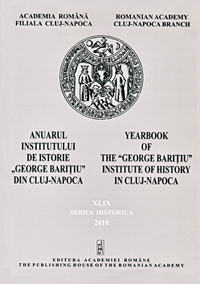Din istoria Partidului Naţional Creştin în Bucovina (1935-1937)
Files from the history of Christian National Party from Bucovina (1935-1937)
Author(s): Radu Florian BrujaSubject(s): History
Published by: Editura Academiei Române
Keywords: Jews; Czernowitz; Legionary Movement; anti-semitism
Summary/Abstract: The National Christian Party had a relative success in Bukovina; even so, it could not polarize the Right political forces, nor could it draw the poll for itself. The local organization, dominated by the controversial personalities such as Nechifor Robu and Constantin Nastasi, managed to implement the program imposed by the Center to the political structure. Recognized as one of the provinces that had a significant population of Jews, Bukovina represented an electoral basis for NCP, but not enough to bring a decisive electoral result. The anti-Semitism, especially in the small towns and cities from Bukovina, was an important factor for Cuza's Party. In reality, the mirage and the originality brought by the Legionary Movement blocked the "Cuzist" projects. The partial successes, such as the elections in Suceava County in 1936, or the arrangement of "spear man" gangs (that terrorized the street), the conflicts with Jews (by the tacit agreement of authorities) were not sufficient to get the power, not even in the North part of the country. Although the elections in 1937 brought a superior result - comparatively with the previous ones - they proved that the National Christian Party was not a viable organization in the context of competition with the legionaries. Their coming to power was, in this case, the result of extended political circumstances, and especially of the king's maneuvers (knowing his interest in power he wanted to take over). The king's fight with the Legionary Movement started, and the role of "cuzists" was just to prepare the stage for this confrontation.
Journal: Anuarul Institutului de Istorie »George Bariţiu« - Series HISTORICA
- Issue Year: XLIX/2010
- Issue No: 49
- Page Range: 83-98
- Page Count: 16
- Language: Romanian

